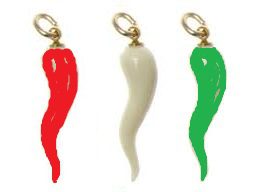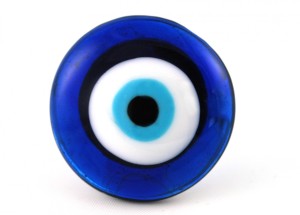“Hey, did you see this?” I asked my Italian girlfriend, holding up an invitation card that we had just received in the mail.
“No, what is it?” she replied, semi-distracted by a book or magazine or something.
“Stefano’s baby is being baptized next month. We’ve been invited to the ceremony.”
“That’s nice.”
“Nice, yeah, but Stefano isn’t religious—not in the least. He watches soccer on Sundays, he doesn’t go to church.”
“So what’s your point?” she asked.
“Well, if he isn’t religious, then why is he having his son baptized?” I assumed it was the obvious question.
“Because he believes that it would be bad luck if he didn’t.”
Bad luck? I sat there just staring at the card for a few seconds, as if it would bestow upon me the logical explanation that I seemed to be missing.
My girlfriend must have sensed my bewilderment, and so she turned to give me her full attention. “Rick, how long have you lived in Italy now?”
“More than two years…”
She could only shake her head in disbelief, “And you still don’t get it, do you?”
I guess didn’t…don’t. This fuzzy gray line between religion and superstition is something that I can’t quite work out in my head. But the more I thought about it, the more I realized how pervasive this attitude is throughout Italy.
Another friend of mine, who is openly agnostic, still crosses himself every time he walks by the front door of a church. From the rear view mirror of his car hangs a medallion of Saint Christopher, the patron saint of motorists, who allegedly protects him from his fellow Roman drivers. What’s more, he feels compelled to grab “the family jewels” every time somebody mentions a potentially unlucky outcome.
“Hey Franco, I hear they’re laying-off workers at your company.”

“Aho’! Abbbellooo!” To which he simultaneously grabs his crotch and the little cornicello charm that he wears around his neck faster than you can blink an (evil) eye.
But he swears that he’s not superstitious—or religious.
Italian Superstitions: Il Malocchio
Yes, the dreaded evil eye (malocchio), the fear of every Italian. Like a bad rash that won’t go away, it will follow you wherever you go. The source of this curse is said to be envy, directed at you—either intentionally or unintentionally—by a friend, co-worker, or archenemy. As far back as Dante they were acutely aware of its destructive power.

“My blood was so afire with envy that
when I had seen a man becoming happy,
the lividness in me was plain to see.”
(Purgatorio, Canto XIV, lines 82–84)
The symptoms of a malocchio curse can be moderate to severe including headache, fatigue, dizziness, a four-game losing streak for your soccer team, or the re-election of Silvio Berlusconi. So you can plainly see that this is nothing to scoff at.
My favorite part about this “malady” is the alleged treatment for it. First you’ll need a jar of Vaseline, a leather saddle, a 12-volt battery, and a set of jumper cables. (No, wait, that’s the treatment for impotence…sorry, Silvio.)
For the malocchio, the cure involves a special ceremony performed by a mother or grandmother who has been properly indoctrinated into the ancient anti-malocchio ritual.
In the presence of the afflicted person, she mixes some combination of water, olive oil, and bodily fluids in a shallow silver platter while reciting the appropriate appeal to Jesus, Mary, or whichever saint happens to be listening. And if you don’t have one of these trained grandmothers in your village, the rites can be performed via Skype these days. Or so I’ve been told.
This ability to remove the malocchio is considered an honored privilege. Not just any random nonna from the south of Italy can execute it—she must have been suitably ordained by one of her elders. What’s more, this “power” can only be passed to the next generation once a year, on Christmas Eve. And of course it goes without saying that the potential candidate MUST be a confirmed Catholic, otherwise these superstitious—I mean, religious—powers won’t work.
Other curses to avoid
Besides the malocchio, what other bad omens should one be wary of?
You cannot throw bread in the garbage. And if you really, really must, then you should kiss it first. Bread is a symbol of Jesus, after all, and you wouldn’t throw Jesus out with the trash, would you? (It was a rhetorical question.)
You must diligently sweep out the corners of a new house to get rid of the evil spirits that had taken up residence with the previous owner. You’ve got your own problems, right? Why would you want to inherit someone else’s, too? But I really question this particular superstition. Nonne are known to be obsessive about cleaning, and I think that this ritual was invented to justify an epidemic of hygiene neurosis among Sicilian grandmothers.
You should always cover up all the mirrors in your house after someone dies. Why? Who the hell knows…
Dream interpretation opens up another dark avenue of superstition, and Italians are creative masters when it comes to inventing a semi-plausible fiction to explain your dreams. My advice is to never share your dreams with an Italian. They’ll always come up with something sinister and disquieting about your unconscious mind, which inevitably becomes a self-fulfilling curse. Better to keep it to yourself.
BUT…according to the Neapolitan smorfia, if you dream of the number 29 (considered lucky), you simply must go play the lottery right away. O cazz’!
If you want to sell your house, bury a statue of St. Joseph in the front yard. Upside down, of course.
For a newlywed couple, the two mothers should make the bed the first time (ha!) that the young spouses sleep together. Some coins should be thrown between the sheets to bring good fortune. And all birth control devices should be confiscated or at least tampered with. (This last part is not really superstition, it’s just being sneaky and manipulative.)
Speaking of beds, never use three people to make a double bed because serious harm or even death will come to the youngest of the trio. Never put a hat on the bed of a sick person nor a hanger on the bed of a healthy person. Again, to do so would be to invite the grim reaper.
Furthermore, regarding Death, if an empty hearse passes in front of you, grab your testicles immediately. If you’re a woman, the nearest pair will do—just grab them as quickly as possible and apologize later.
What are some of the bizarre Italian superstitions that you’ve heard about? Please share!
Oh ye of little faith…
Of course I don’t personally believe in any of this nonsense. But while these things seem ridiculous to the Anglo-American way of thinking, I can assure you that they are widely held “beliefs” throughout Italy, even if some people are reluctant to admit it candidly.
And it’s not just Sicilian grandmothers; it’s doctors, businessmen, school teachers, and policemen. Young and old, from the North to the South. Every segment of society participates, whether they realize it or not.
So when you see a self-proclaimed “non-believer” spontaneously crossing himself or grabbing his testicles, you’ll know that he’s not necessarily praying, nor does he have a chronic fungal condition in his nether regions. More likely, he’s battling against something far more sinister. A curse, a jinx, or the dreaded malocchio.
The history behind these beliefs is fascinating and I really enjoyed researching it for this article. During the course of my research, I even came across the actual top-secret prayer that is used in the ceremony to remove the malocchio. It’s in dialect, so I had to have it translated for me. I must say, it’s interesting, if not a little creepy—like something out of a Steven King novel. I am tempted to share it with you here on my blog, but of course that would be bad luck. So I’d better not. Just in case. You never know.
In nomine Patris, et Filii, et Spiritus Sancti…
Amen
(UPDATE: Due to popular demand, I’ve written a follow up post on this subject here: More on the Malocchio and Italian Superstitions)


Can you tell me about the Recoario eyes please?
Covering mirrors during mourning is an ancient Jewish custom. Which is probably where this comes from. In Judaism, it is so that the mourners are not distracted by their own appearance during the eight days of shiva.
Yes, there’s a lot of “borrowing” when it comes to both superstition and religion. Ciao, Stella!
I always have a lot of fun while reading your blog but… let me ask you something: Where do you live? What kind of Italians do you usually deal with? How can you say that you Malocchio is “the fear of every Italian? Well, not mine, for sure, and I know lots of Italian people who like me do not care for rituals or numbers or spirits. But I do agree, it’s funny how some guys are affected by all this stuff.
Hey Letizia! Not sure what you mean by “what kind” of Italians that I deal with. After living in Rome for several years and travelling around the whole country, I’d have to say “every type,” I suppose. In any case, it seems that you’ve taken my blog too seriously and missed the irony. 🙂 I don’t really mean that all Italians are superstitious, but to the uninitiated foreigner, it sure seems that way sometimes. But again, my goal was humor and entertainment in this particular post rather than serious social analysis. Ciao!
I remember my mother saying you should never cut bread – you tear it with your hands, but didn’t know what the background of that was. I appreciate everyone above contributing to the history and explanations of these traditions.
I’ve heard that one, too, but I haven’t been able to confirm the reason for it either. It’s a fascinating topic, though. Thanks for your comments Anna!
What about passing a knife breaking a relationship? I heard this one 25 yrs. ago, and still can’t pass a knife to someone I care about. You place it on a neutral surface and someone else picks it up.
An owl appearing at a house is a sign of death in the family.
We Catholics are the same everywhere. I’m from the US had to explain to a US friend who’s Protestant-Jewish that baptising their child Catholic had no real implications for her upbringing. It was the right thing to do for his in-laws who are very good to him. Another Catholic friend and I explained: “throw some water on the baby’s head, have a party, and everyone’s happy. It doesn’t really mean anything – unless you don’t do it.”
Jodie, you’ve explained it better than I could. That’s exactly right–it doesn’t mean anything, but what could it hurt? “Just in case, you never know.”
Thanks for your comments!
Hi Rick, one of superstitions I’ve encountered in Italy and which I find pretty annoying, is that you can’t celebrate your birthday BEFORE your actual birthday, because it’s bad luck. So if your birthday is on a Monday, no celebrating the weekend before!
Another one is to never place a hat on a bed.
Both of these are related to bringing very bad luck, like death.
Some people take these kinds of superstitions VERY seriously. But I was also very careful not to step on cracks when I was younger, and I try not to walk under ladders, so I might not be any better!
Yes, I’ve also encountered the birthday superstition! I once wished someone happy birthday the day before the actual day and they were REALLY mad at me. At first I thought they were joking, but nope, they were quite angry.
Thanks for the comment!
Also in the U.S., a St. Joseph statue (we purchased from a Catholic store, included directions!), buried upside down (so that his feet are pointing to heaven), in your front yard, in front of the door, sold our house after it sat inactive on the market for months! 🙂
Never underestimate the power! Great story and thanks for explaining the reason behind the “upside down” position!
Rick, you miss to explain the concept of Iella and Iettatore, in absolute the more terrific energy and form of life of universe!
Remember: fortune is blind, but rotten luck see you very well
Giusto!
Also, I had this friend who was so obsessed with malocchio, that she would never share good news for fear of being envied. Whatever good thing happened to her, she concealed it or, when this was not possible, she’d understate in a depressing “Yeah, but it’s not big deal”. Eventually I think she just seemed so sad and miserable all the times that no malocchio could compare.
That’s right–one sure way to take away the power of the malocchio is to make sure that your life can’t possibly be any worse!
My mother used to tell me that the first phone call you receive after midnight on NY’eve must come from a man (or the first wishes you receive, anyway). Except she would always break that rule calling me at midnight sharp. Every time I told her: “Mum! Why did you call me so soon? You taught me I should receive a phone call from a man for good luck”. She’d either say: “No man called you yet?” (00,00…) or “Vaffanculo”.
Sounds like she’s trying to fulfill her own prophecies. There’s bad luck and then there’s bad luck with some extra help from others. Next year try calling her at midnight, mi raccamando!
mmmmmmmm…it seems to me that some of these superstitions (some of them quite rare or with double interpretation-for example the bed for newlyweds should be prepared by 2 young girls and not by mothers) are more “southern” than “all over the country”. Anyways here you’ll find everywhere number 13 and “only often” 17…..
Ciao Federico! Thanks for your input. Yes, I’m sure you’re right–I’m just one observer and my experience isn’t necessarily statistically accurate, so I’m sure there is plenty of variation throughout the country. But still, as a foreigner it’s fun to learn about these things and share my observations with others. Ciao!
I searched for some of their origin last year, when I had a lesson about superstitions. It’s incredible how you do things instinctively, without knowing the reason.
For example:
– the mirror represents the soul. If you break it, you’ll lost a part of your soul (and so you’ll have 7 years of bad luck)
– pour the wine keeping the hand overturned brings bad luck, because in the past it was the signal given by traitors to show to killers the victim to be killed
– light up a sigarette as third using the same match brings bad luck because it’s a symbol of death, linked to the war: during the war the first light lights up a soldier, the second one permits to take aim and the third permits to kill the third soldier
– stepping on shit is linked to the war as well: where a cow passed (and left a “souvenir”), a man can pass too, without finding a mine
But, if you want to go back to religion:
– you can’t open an umbrella indoors because it indicates the priest’s assistant during the extreme unction (and consequent death). You can’t put a hat on a bed because during the same ritual the priest used to do it
– never leave money on the bed! It was used in the past to pay for the doctor when someone was really sick
I still don’t know why persons belonging to the same family shouldn’t pass a bar of soap, but the effect is well known: big troubles in the whole family!
So be careful and, more important, don’t waste salt!
Wow, you did a lot more research than me, it seems! Some of the explanations actually make a little bit of sense. I hadn’t heard the one about the soap…maybe it has more to do with hygiene than superstition!
Ciao!